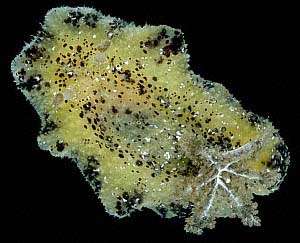
Thordisa villosa
(Alder & Hancock, 1864)
Order: NUDIBRANCHIA
Suborder: DORIDINA
Family: Dorididae
DISTRIBUTION
Indo-West Pacific
PHOTO
Koumac, New Caledonia, 2m, October 1993, 70mm long alive. PHOTO: Bill Rudman.
The dorsum is translucent yellow with a characteristic pattern of dark brown patches around the mantle edge, while the underside is a bright orange yellow with small brown spots on the underside of the mantle and the sides of the foot. The dorsum is tuberculate and some of the larger tubercles have a long tapering fluid filled papillae.
Reference:
• Alder, J. & Hancock, A. (1864). Notice of a collection of nudibranchiate mollusca made in India by Walter Elliot Esq., with descriptions of several new genera and species. Transactions of the Zoological Society of London, 5: 113-147.
Rudman, W.B., 1999 (January 13) Thordisa villosa (Alder & Hancock, 1864). [In] Sea Slug Forum. Australian Museum, Sydney. Available from http://www.seaslugforum.net/find/thorvill
Related messages
Thordisa? from New Caledonia
August 16, 2007
From: Jean-François Hervé
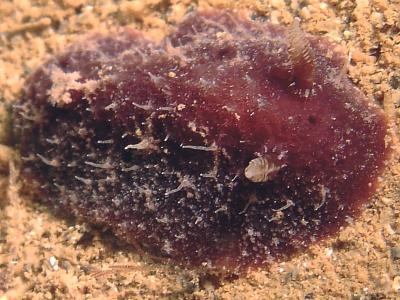
Dear Bill
A friend give me this pictures. First, I believed it's a Discodoris sp. but I don't see the same spines on the mantle in the forum.
Thanks for your answer and for the forum.
Locality: 10 m, New Caledonia, Pacific ocean, june 06, sand. Length: 4 cm. Photographer: Cédric Mitel.
Jean-François Hervé
jfherve@free.fr
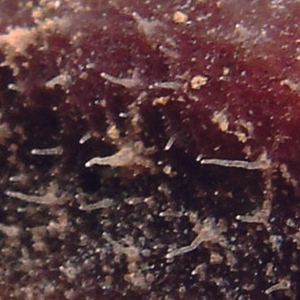
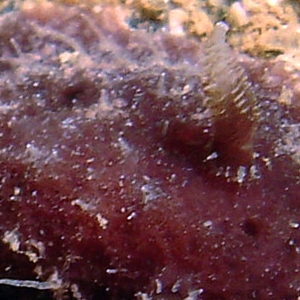
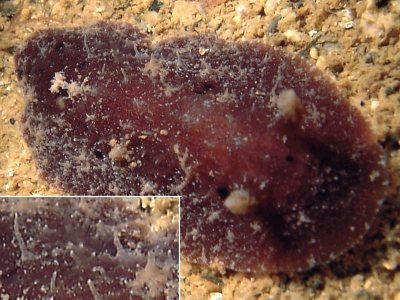
Dear Jean-François,
This is almost certainly a species of Thordisa. I have previously identified animals such as this as T. villosa, but a recent publication suggests there are quite a few different species. Until I have time to digest this study by Chan & Gosliner, I can't say what species it is.
- Chan, J.M. & Gosliner, T.M. 2007. Preliminary Phylogeny of Thordisa Nudibranchia: Discodorididae) with Descriptions of Five New Species. The Veliger, 48(4): 284–308.
Best wishes
Bill Rudman
Thordisa villosa? from Nelson Bay
March 14, 2003
From: Dave Harasti
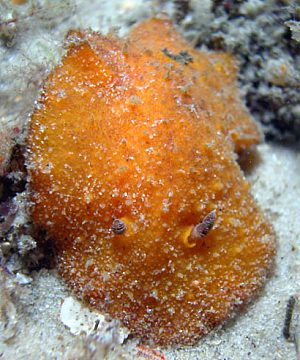
Hi Bill,
I have attached a couple of images that were all taken at night at Fly Point, Nelson Bay NSW, Australia.
I think they are all colour variations of Doriopsilla peculiaris. The unusual thing with this animal is that I have never seen one during the day but when ever I do a night dive at Fly Point they appear to be common! Defnitely a nocturnal species in my view.
Regards,
Dave Harasti
diving@webone.com.au
Harasti, D., 2003 (Mar 14) Thordisa villosa? from Nelson Bay. [Message in] Sea Slug Forum. Australian Museum, Sydney. Available from http://www.seaslugforum.net/find/9323Dear Dave,
I have put the other two photos in a separate message because they are most probably D. peculiaris. This animal though is most probably Thordisa villosa. If you look carefully you can see the tapering papillae on its back. It's not usually so orange in colour but we have a message on the Forum from Ron Greer with a very similar looking animal.
Best wishes,
Bill Rudman
Thordisa villosa Chek Jawa, Singapore
January 31, 2003
From: Ria Tan
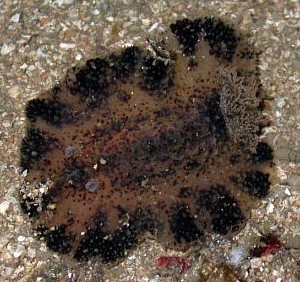
Dear Bill,
Here ia another animal from the intertidal flat at Chek Jawa, Singapore. Photo: Alan Yeo
Best wishes,
Ria Tan
tanria@singnet.com.sg
Tan, R., 2003 (Jan 31) Thordisa villosa Chek Jawa, Singapore. [Message in] Sea Slug Forum. Australian Museum, Sydney. Available from http://www.seaslugforum.net/find/9047Dear Ria,
This is another sponge-feeding dorid which I think is Thordisa villosa. Apart from that I'm afraid I haven't got anything interesting to say about it.
Cheers,
Bill Rudman
Thordisa villosa from Sydney
March 18, 2001
From: Erik Schloegl
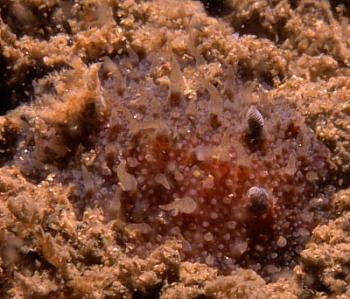
Dear Bill,
Here's another specimen from Camp Cove, Sydney Harbour. About 2cm long, I didn't even recognize it as a nudibranch at first, slightly buried as it was in the mud covering a rocky reef at a depth of about 4m. The photo was taken several hours after sunset on April 15, 1999.
Best regards,
Erik
Erik.Schlogl@uts.edu.au
Schloegl, E., 2001 (Mar 18) Thordisa villosa from Sydney. [Message in] Sea Slug Forum. Australian Museum, Sydney. Available from http://www.seaslugforum.net/find/3897Dear Erik,
I am pretty sure this is Thordisa villosa, which is another widespread Indo-West Pacific species which is quite variable in colour. The long tapering tentacle-like papillae on is mantle are quite characteristic. I'll try and post some more photos of this species to show some of the variations in colour I have found.
Best wishes,
Bill Rudman
Thordisa villosa? from Port Stephens, NSW
June 17, 2000
From: Ron Greer
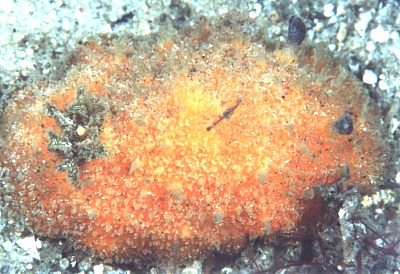
Dear Bill,
Late last year I sent you a couple of images for ID that you confirmed as Petalifera ramosa. That week of diving was the most prolific I had seen in 10 years at Fly Point [Port Stephens, New South Wales, Australia]. Of the 25+ species I saw were 5 that I have been unable to ID. Here is one of them. I hope you can ID for me.
Regards,
Ron
diveimage@i-o.nat.au
Greer, R., 2000 (Jun 17) Thordisa villosa? from Port Stephens, NSW. [Message in] Sea Slug Forum. Australian Museum, Sydney. Available from http://www.seaslugforum.net/find/2412Dear Ron,
I can't be 100% sure but I think this is Thordisa villosa. It usually has some black patches around the mantle edge but the shape and papillae make me think it is a pale form of T. villosa.
Best wishes,
Bill Rudman.
Thordisa villosa fromWestern Australia
January 13, 1999
From: Clay Bryce
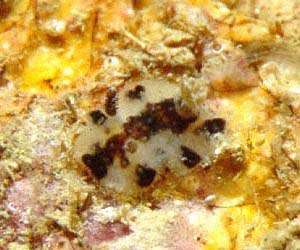
Dear Bill,
I have tentatively identified this photo of mine as Discodoris boholiensis. It is from Legendre Island, Dampier Archipelago, Western Australia. Depth 10m.
Best wishes,
Clay Bryce.
Western Australian Museum
Perth.
brycec@museum.wa.gov.au
Bryce, C., 1999 (Jan 13) Thordisa villosa fromWestern Australia. [Message in] Sea Slug Forum. Australian Museum, Sydney. Available from http://www.seaslugforum.net/find/462Clay,
I think this is a juvenile of Thordisa villosa which is usually a translucent white to pale yellow with dark brown, often wedge-shaped patches around the mantle edge. It also has whitish tapering papillae on the back, which I can see signs of in your photo.
Bill Rudman.
